Module 1 How to learn English.Unit 1 Let's try to speak English as much as possible.课件
文档属性
| 名称 | Module 1 How to learn English.Unit 1 Let's try to speak English as much as possible.课件 |
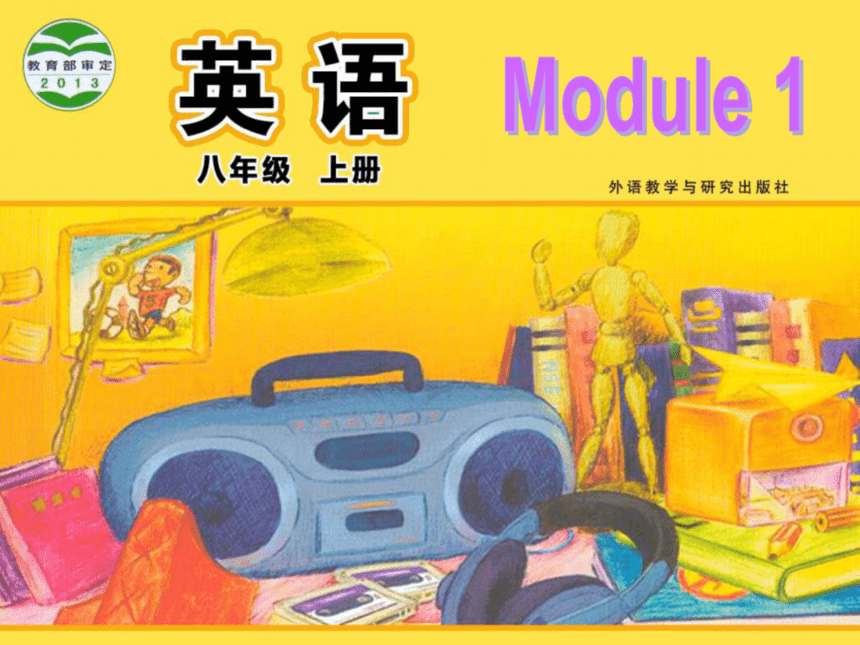
|
|
| 格式 | zip | ||
| 文件大小 | 4.0MB | ||
| 资源类型 | 教案 | ||
| 版本资源 | 外研版 | ||
| 科目 | 英语 | ||
| 更新时间 | 2018-04-07 18:56:43 | ||
图片预览

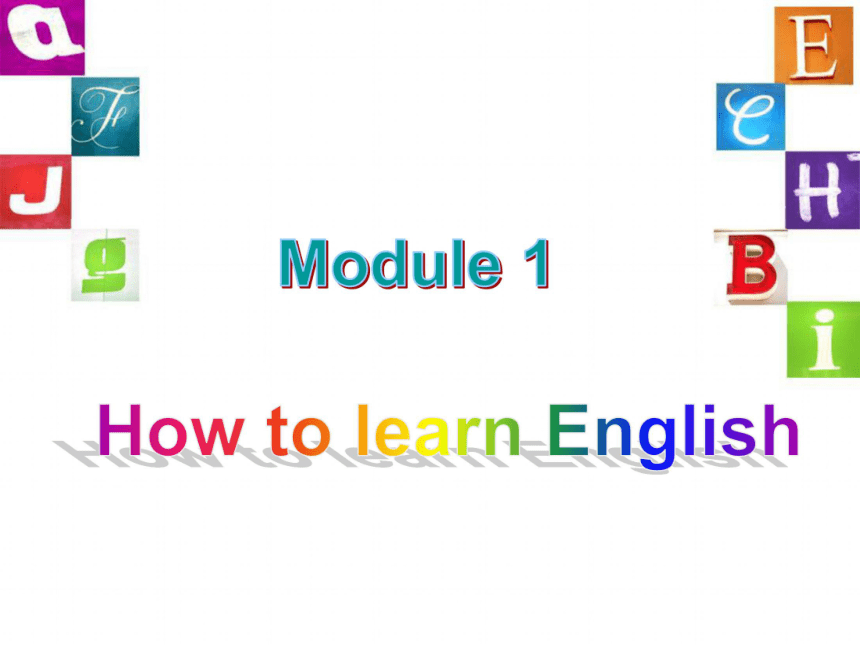
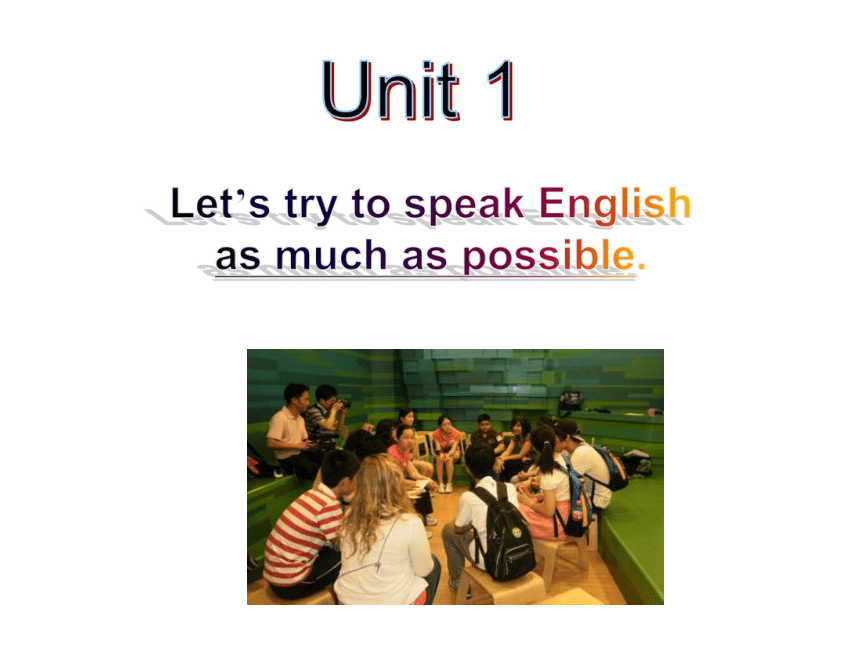
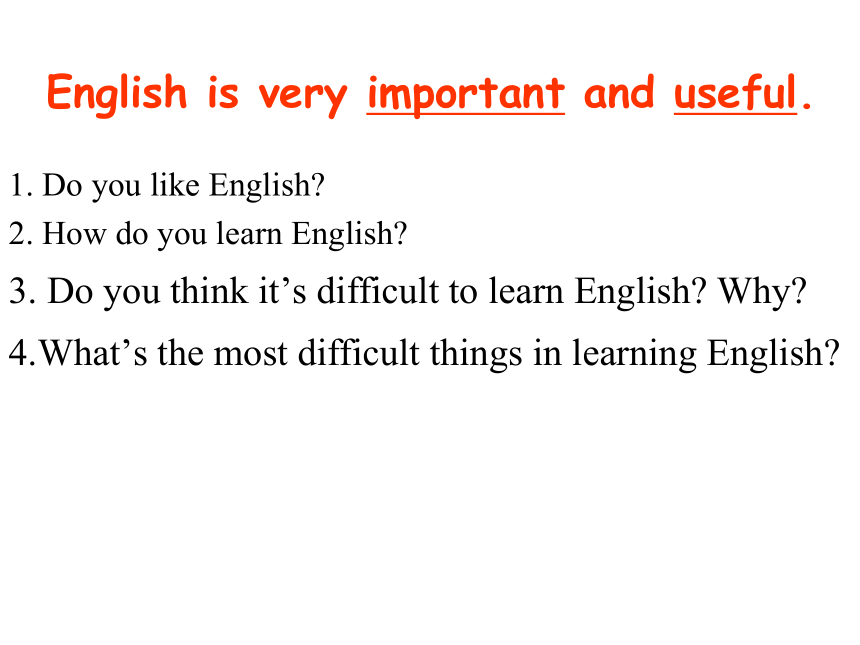
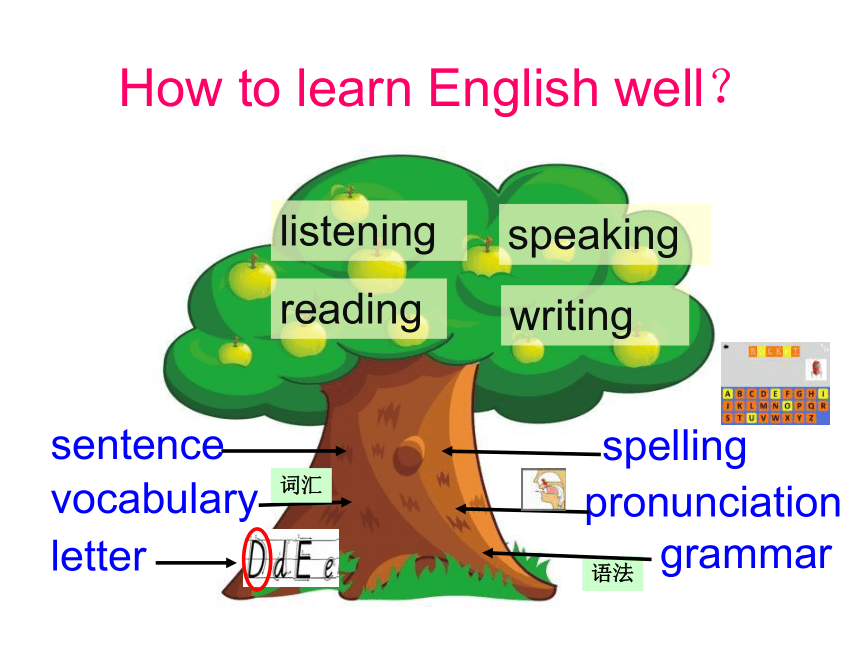
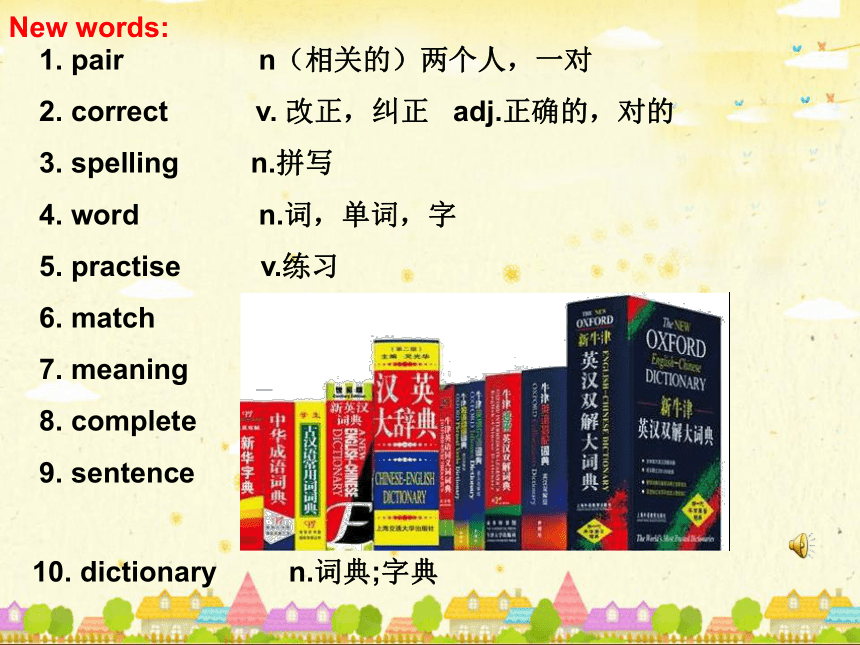
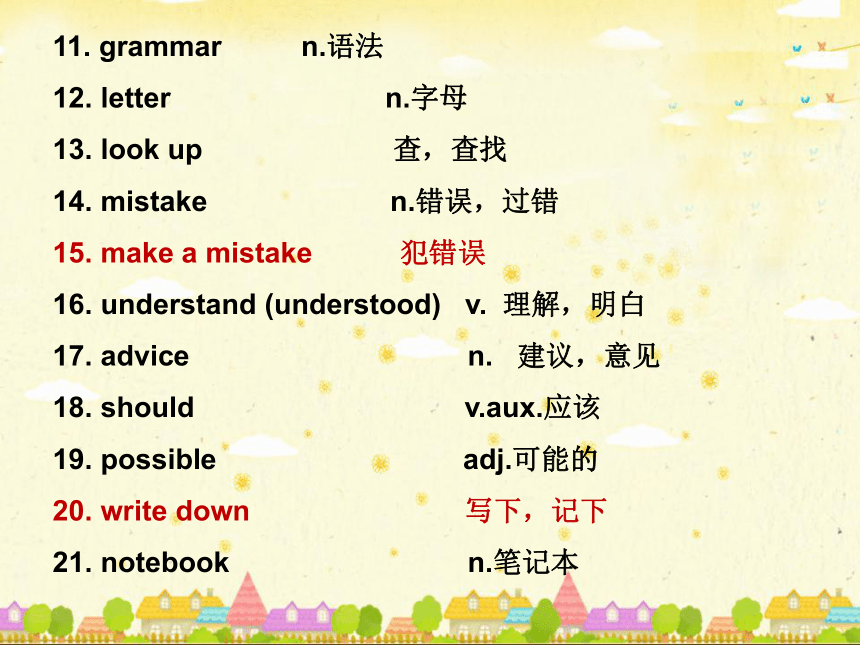
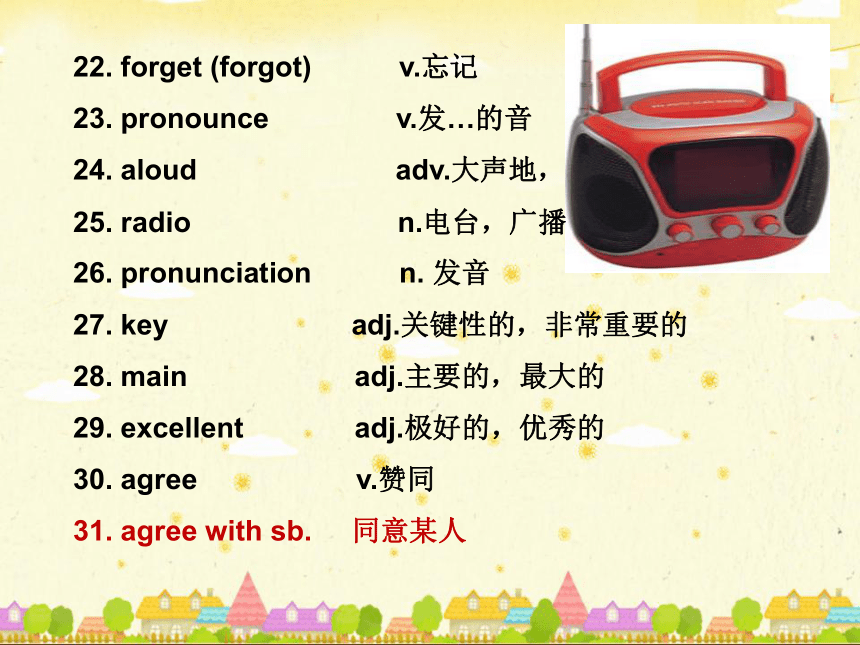

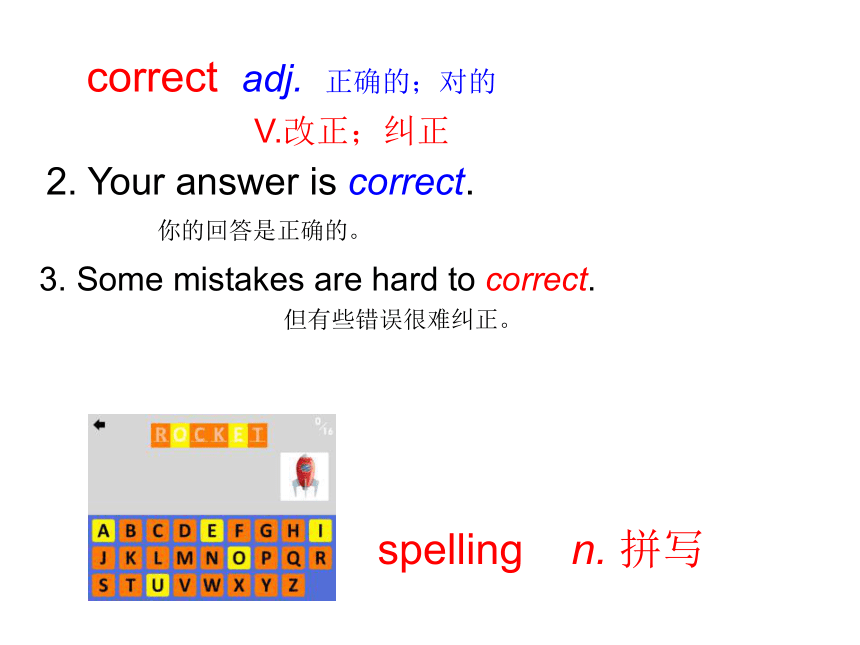
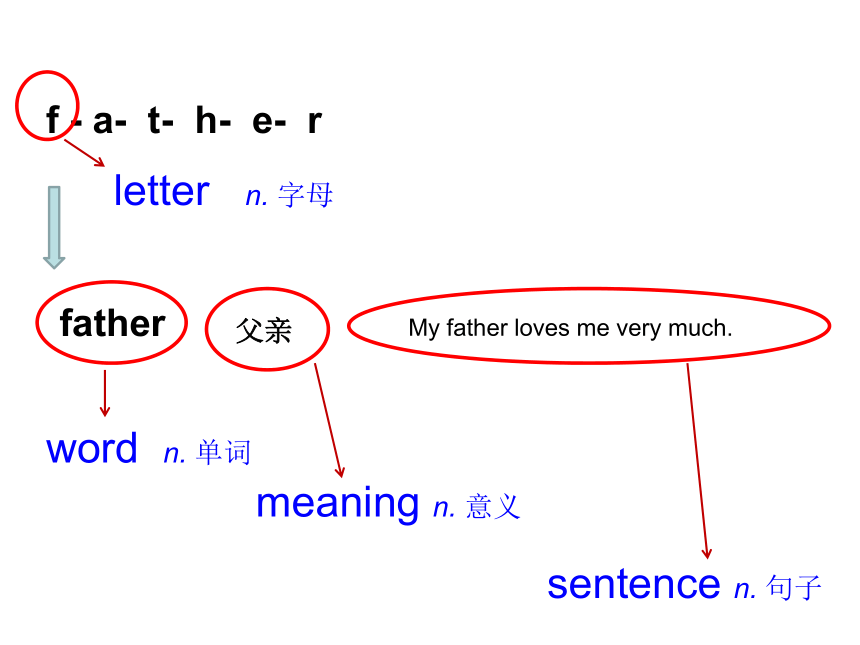
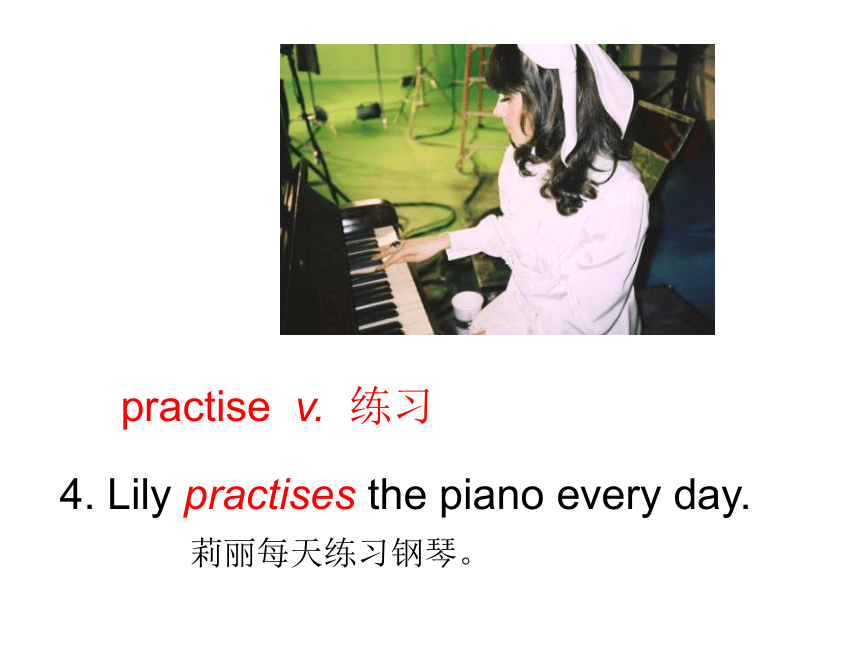
文档简介
课件73张PPT。Module 1Module 1
How to learn English
Unit 1 Let’s try to speak English
as much as possible.
English is very important and useful.1. Do you like English?
2. How do you learn English?
3. Do you think it’s difficult to learn English? Why?
4.What’s the most difficult things in learning English?
listeningspeakingreadingwritinglettervocabularysentencegrammarpronunciationspellingHow to learn English well? 语法词汇1. pair n(相关的)两个人,一对
2. correct v. 改正,纠正 adj.正确的,对的
3. spelling n.拼写
4. word n.词,单词,字
5. practise v.练习
6. match v.找到与…相配之物,使相配
7. meaning n.意义
8. complete v.把…填完整,使完整
9. sentence n.句子
10. dictionary n.词典;字典
New words:11. grammar n.语法
12. letter n.字母
13. look up 查,查找
14. mistake n.错误,过错
15. make a mistake 犯错误
16. understand (understood) v. 理解,明白
17. advice n. 建议,意见
18. should v.aux.应该
19. possible adj.可能的
20. write down 写下,记下
21. notebook n.笔记本22. forget (forgot) v.忘记
23. pronounce v.发…的音
24. aloud adv.大声地,出声地
26. pronunciation n. 发音
27. key adj.关键性的,非常重要的
28. main adj.主要的,最大的
29. excellent adj.极好的,优秀的
30. agree v.赞同
31. agree with sb. 同意某人25. radio n.电台,广播
pair n. 两个人,一对儿1. They are really a happy pair. 那对新婚夫妇真是快乐的一对。 spelling n. 拼写2. Your answer is correct. 你的回答是正确的。 correct adj. 正确的;对的
V.改正;纠正
3. Some mistakes are hard to correct.
但有些错误很难纠正。f - a- t- h- e- r letter n. 字母father 父亲word n. 单词meaning n. 意义sentence n. 句子My father loves me very much.
4. Lily practises the piano every day.
莉丽每天练习钢琴。practise v. 练习look …up 查; 查找5.You should look up this word in the dictionary. 你可以在字典里查这个词。 dictionary
n. 词典;字典mistake n. 错误;过错6. Sorry, I make a mistake.
对不起,我错了。7. I don’t understand.
我不明白。understand v. 理解;明白understand---understoodadvice n. 意见;建议8. You should give it a try. 你应该试一试。 should v. aux. 应该9. Is it possible to fix my computer?
我的电脑能修好吗? 10. I will never forget it.
我将永远不会忘记。possible adj. 可能的forget v. 忘;忘记forget-forgotnotebook n. 笔记本11. He reads English aloud every morning. 他每天早晨练习朗读。 aloud adv. 大声地;出声地radio n. 电台;广播listen to the radio 听广播、 听电台 12. The key factor to success is hard work. 成功的关键因素是努力工作。 key adj. 关键性的,非常重要的13.What’s the main point of the lesson?
这篇课文的主旨是什么?main adj. 主要的;最大的14.She is an excellent teacher. 她是一位出色的教师。 excellent adj. 极好的;优秀的agree with sb. 同意某人15. I really agree with you. 我非常赞同你的观点。1. Read the instructions and check(√) the ones you understand.
1. Work in pairs. Ask and answer the
questions.
2. Correct the spelling.
3. Listen and check the words you hear.
4. Practise saying the words.
5. Match the words with their meanings.
6. Complete the sentences with the
words in the box.√√√√√√Listening and vocabularydictionary grammar letter look up
make a mistake understand2. Listen and answer the questions. Use the words and expressions in the box. 1. Which word did Daming not understand?
Spring.
2. What mistake did Lingling make?
A grammar mistake.
She said “go” instead of “went”.
3. How does Daming usually check the spelling of a word?
He looks it up in the dictionary.
4. Why was it difficult for Daming to check the spelling of cinema?
Because he didn’t know the first letter.
What advice can you hear ?Listen and readWhat advice can you hear?1.We should always speak English in class!
2. Let’s try to speak English as much as possible.
3. Why not write down the mistakes in our notebooks?
4. Don’t forget to write down the correct answers next to the mistakes.
How to learn English well?
5. It’s a good idea to spell and pronounce new words aloud every day.
6. How about listening to the radio?
7. What about reading English stories?
8. Why don’t we try to find some English pen friends?
How to learn English well?1. should (should do sth.) 应该做……We should always speak English in class.
He often gets up late.He _______ _______ up early.should getMr Li drives too fast.He _________ _______ too fast.Shouldn’t drive He ________ _______ slowly.should driveLanguage points:I watch TV all the time.You __________ ________ TV all the time.shouldn’t watch(一直)He had an accident.He _________ ______ more careful.should beTao Tao plays computer games every day.He __________ ______ computer games every day.Shouldn’t play2. Let’s try to speak English as much as possible.让我们尽可能多地说英语。
① Let’s=Let us (+V原)
② Try to do sth. 设法/尽力做某事
否定: try not to do sth.
e.g.:Let’s go and play football.
Let’s ________(have) a rest.
③ as … as possible
as +形容词/副词 原级+ as possible 尽可能……
Can you read it as loudly as possible? 你能尽可能读得大声一点吗?Language points:尽可能多地have3. Why not write down our mistakes in our notebooks? 为什么不把错误写在笔记本上呢?
Why not do …? = Why don’t you do… “为什么不……”表建议
write down put down:记下,写下
e.g. ① Your shoes are old. _______buy a new pair?
Why notLanguage points: Why don’t you take a walk in the park?e.g.
① I’ll _____ the prices _____ on the back of this book.
我会把价钱记在这本书的背面的。
② ________________ your ideas in your notebook? 何不把你的想法记在笔记本上? write downWhy not put downwrite down put down:记下,写下Language points:Language points:3. How about listening to the radio? 听广播怎么样?
What about…? (+v.-ing) ……怎么样?
例:How about going swimming with me?
跟我一起去游泳怎么样?
-What about _____some milk?
-OK! Let’s go shopping.
A. buy B. buying C. to buy D. buys4. And don’t forget to write down the correct answers next to the mistakes. What else?
但是不要忘记把正确答案写在错误答案的旁边。还有吗?
= What else should you do?
不定代词: something,anything, somebody, someone
疑问词: what, who, where
表示“另外的,别的”。Language points:+ else① We have said we’re sorry. _________ can we say?
我们已经道过歉了。还能说些什么呢?
② If I can’t trust you, ________ can I trust? 如果不能相信你,我还能相信谁呢?
③ The book isn’t here. _________ should I took?
那本书不在这里。我应该再去哪里找呢?who elseWhere else What elseLanguage points:5. It’s a good idea to spell and pronounce new words aloud every day. 每天拼写并大声朗读生词是个好主意。
e.g.: It’s a good idea to go out for a walk after dinner.
晚饭后出去散步是个好主意。
It’s a bit difficult to learn English well.
学好英语有点困难。
Language points:6. That’s good for our pronunciation. 它有益于我们的发音。
=That is good for…
be good for 对……有益
be bad for 对……有害
Eating more vegetables is good for our health.
多吃蔬菜有益于我们的健康。
Eating junk food is bad for our health.
吃垃圾食品有害于我们的健康。表示提建议的句型有:How/What about … ?
Try to/ Try not to … ?
Let’s …
Why don’t you…?
Why not…?
You should/shouldn't …
It's a good idea to do...
Don’t forget to/ Remember to do… doing sth.do sth. do sth.常用的回答是:That’s a good/great idea./OK./ All right.Everyday EnglishReady?
That’s a good idea.
What else?
Thanks a lot.
Excellent!
I agree with you.____________________________________________________________________________________________________________________________________________________________________________________
____________________________________Listening: listen to the radio.
Speaking:
Reading:
always speak English in class/ try to speak English as much as possible/ listen to the radio. just need to understand key
words and main ideas; read English stories.Now write notes about learning English. ________________________________________________________________________________________________________________________________________ try to find some English pen friends and write to them.
spell and
pronounce new words aloud every day.Learning new words:Writing:1. We should always speak English in class.
2. Let’s try to speak English as much as possible.
3. Why not write down our mistakes in our notebooks?
4. It’s a good idea to spell and pronounce new words aloud.
5. How about listening to the radio?
Now listen again and repeat.5. Listen and mark the intonation.J: You ______ always speak English in class. And you _______ write down your mistakes in your notebooks. And _________ you write down the correct spelling and grammar next to the mistakes?
L: It’s __________ to check your vocabulary notebook every day.
J: That’s a good idea. Thanks a lot, Lingling. __________ listening to the radio or reading a newspaper in English? But ________ to translate every word.
L: I think everyone ________ have a pen friend and write email messages to each other. I’m going to meet my pen friend in Beijing this term.shouldshouldwhy don’ta good ideaHow abouttry notshouldRead and fill in the blanksHere’s my (1) advice / notebook on learning English. Speak English (2) always / as much as possible in class, and listen to English (3) in the newspaper / on the radio. 4. Underline the correct words and expressions.I (4) agree / forget it is a good idea to look up new worlds in the ( 5) notebook / dictionary. You can find the (6) correct / excellent pronunciation and learn the meaningPair work I can’t get any fish.Why not go to the market?Why don’t we watch a film?Let’s go for a walk.That’s a good idea.I don’t know the way.Why not follow me?I’m thirsty!Why don’t you … ?I’m feeling bad, baby.Why not see a doctor?Talk about problems in learning English and give advice.
Problems Advice
I can’t… How / What about …?
I don’t know… Why don’t you / not…?
— I can’t speak English well. What should I do?
— Why don’t you try talk to our classmates in English?Work in pairs.Conclusion1.We should always speak English in class!
2. Let’s try to speak English as much as possible.
3. Why not write down the mistakes in our notebooks?
4. Don’t forget to write down the correct answers next to the mistakes.
5. It’s a good idea to spell and pronounce new words aloud every day.
6. How about listening to the radio?
7. What about reading English stories?
8. Why don’t we try to find some English pen friends?
advice表示提建议的句型有:How/What about … ?
Try to/ Try not to … ?
Let’s …
Why don’t you…?
Why not…?
You should/shouldn't …
It's a good idea to do...
Don’t forget to/ Remember to do… doing sth.do sth. do sth.常用的回答是:That’s a good/great idea./OK./ All right.小试身手— How about going camping in the
mountain?
— _____________ .
A. Me, too B. Good idea
C. It doesn’t matter D. Help yourself
2. When you don’t know a word, you can _____ in the dictionary.
A. look it up B. set it up
C. give it up D. pick it up 3.—Why couldn't you______ the
correct spelling of the word?
—Err. . . I hadn't got a Chinese-English dictionary at hand.
A. look for B. look down
C. look up D. look at 4. — Why not get your husband a CD
player for his birthday?
— ________. But that’s too expensive.
A. Good idea! B. I agree with you.
C. No way! D. Not at all.
5. — It's going to rain. Remember _____
an umbrella when you go to school.
— All right, Mom.
A.taking B.bringing
C.to take D.to bringExercises一、翻译下列短语:
1.犯错
2.写下
3.同意某人
4.给某人一些建议
5.为何不做某事
6.让我们一起做某事make a mistake
write down
agree with sb.
give sb. some advice
why not do sth.
let’s do sth. 7.好主意
8.不要忘记去做某事
9.正确的答案
10.别的什么事
11.好主意去做某事That’s a good idea
don’t forget to do sth.
the correct answers
What else
It’s a good idea to do 12.听收音机
13.最好不要去做
某事
14.不必去做某事
15.一样重要
16.彼此写信listen to the radio
It’s better not to do sth.
don’t need to do sth.
as important as
write to each other Bshould/ speak English / in class1.You ____________________________. Try to…Should speak English in class.2. ____________________________.Try to speak English in class.3. ______________speak Chinese in class.Try not toAshould, Listen to the teacher carefullyYou should_______________________. listen to the teacher carefully
Try to…Try to listen to the teacher carefully.Try to do sth
尽力去做某事Try not to do sth
尽量不要去做某事Do some exercises:1. Fill in the blanks: (1) She should (go) to school early. go (2) Why don’t you (play) basketball? play(3) How about (eat) noodles?eating (4) There are five (mistake) in your homework. (5) She is going to (help) his father.(6) It’s a good idea to (get) up early.(7) He (play) football very well.(8) My mother has six (pen friend).mistakeshelpgetplayspen friends二、完成句子:
1. 我将给你们一些学英语的建议。
I’m going to __________________ about studying English.
2. 课堂上你应该总是说英语。
You _________________ English in class.
3. 我和我的笔友互相发电子邮件。
My pen friend and I ______________ each other. give you some advice
should always speak
send e-mails to 4. 不要忘记每天检查你的词汇本。
__________________ your vocabulary notebook every day.
5. 尽量不要逐字翻译。
_________________ every word.
6. 为什么不把你的正确拼写写在错误旁边呢?
__________________ the correct spelling next to the mistakes?Don’t forget to check
Try not to translate
Why not write down 7. 你还想知道别的什么事?
_________ do you want to know?
8. 我完全同意你的意见。
I quite __________ you.
9. 我认为写与读一样重要。
I think writing is _____________
reading.What else
agree with
as important as I can’t…
I don’t know…
e.g. I don’t know many words.
I will try to write them down in my notebooks.
My pronunciation is bad.
I will listen to the radio, and try to speak English as much as possible.Now let’s do some exercise.1. A: Do you like English?
B: Yes, why?
A: _______ listen to an English song after class!
B: ________.
2. A: What are you going to do this evening?
B; I think I will stay at home.
A: ___________________ watch an English film with me?
B: ______________.
3. A: This English article is difficult.
B: ____________________ choose an easier one?Choose the words to complete the dialogue:Good idea. Why don’t you, What else, Let’s Why not
How about, practice speaking, OK, Excellent! All rightLet’s Good idea./OK./Excellent./All rightWhy don’t you/Why not Good idea./OK./Excellent./All rightWhy don’t you/Why not 4. A: How can I speak English well.
B: You should often _______________ English
5. A: _____________________ write down the correct words next to the mistakes?
B: ________.
6. A: Mum, I have swept the floor,_________ should I do?
B: That’s OK. Thank you.
7. A: ___________________ talking to our foreign teacher?
B: _________.
8. A: I’m not good at English.
B: _____________________ speak more English in class and listen to the teacher carefully?
A: ___________, I will.practice speaking Why don’t you/Why not Good idea./OK./Excellent./All rightWhat else What about/How about Good idea./OK./Excellent/All right.Why don’t you/Why not OK/All rightWe should always speak English in class.
Let’s try to speak English as much as possible.Copy the words of Unit 1
Act out the text with your partner.
Prepare the text of Unit 2.Have a nice day!
Unit 1 Let’s try to speak English
as much as possible.
English is very important and useful.1. Do you like English?
2. How do you learn English?
3. Do you think it’s difficult to learn English? Why?
4.What’s the most difficult things in learning English?
listeningspeakingreadingwritinglettervocabularysentencegrammarpronunciationspellingHow to learn English well? 语法词汇1. pair n(相关的)两个人,一对
2. correct v. 改正,纠正 adj.正确的,对的
3. spelling n.拼写
4. word n.词,单词,字
5. practise v.练习
6. match v.找到与…相配之物,使相配
7. meaning n.意义
8. complete v.把…填完整,使完整
9. sentence n.句子
10. dictionary n.词典;字典
New words:11. grammar n.语法
12. letter n.字母
13. look up 查,查找
14. mistake n.错误,过错
15. make a mistake 犯错误
16. understand (understood) v. 理解,明白
17. advice n. 建议,意见
18. should v.aux.应该
19. possible adj.可能的
20. write down 写下,记下
21. notebook n.笔记本22. forget (forgot) v.忘记
23. pronounce v.发…的音
24. aloud adv.大声地,出声地
26. pronunciation n. 发音
27. key adj.关键性的,非常重要的
28. main adj.主要的,最大的
29. excellent adj.极好的,优秀的
30. agree v.赞同
31. agree with sb. 同意某人25. radio n.电台,广播
pair n. 两个人,一对儿1. They are really a happy pair. 那对新婚夫妇真是快乐的一对。 spelling n. 拼写2. Your answer is correct. 你的回答是正确的。 correct adj. 正确的;对的
V.改正;纠正
3. Some mistakes are hard to correct.
但有些错误很难纠正。f - a- t- h- e- r letter n. 字母father 父亲word n. 单词meaning n. 意义sentence n. 句子My father loves me very much.
4. Lily practises the piano every day.
莉丽每天练习钢琴。practise v. 练习look …up 查; 查找5.You should look up this word in the dictionary. 你可以在字典里查这个词。 dictionary
n. 词典;字典mistake n. 错误;过错6. Sorry, I make a mistake.
对不起,我错了。7. I don’t understand.
我不明白。understand v. 理解;明白understand---understoodadvice n. 意见;建议8. You should give it a try. 你应该试一试。 should v. aux. 应该9. Is it possible to fix my computer?
我的电脑能修好吗? 10. I will never forget it.
我将永远不会忘记。possible adj. 可能的forget v. 忘;忘记forget-forgotnotebook n. 笔记本11. He reads English aloud every morning. 他每天早晨练习朗读。 aloud adv. 大声地;出声地radio n. 电台;广播listen to the radio 听广播、 听电台 12. The key factor to success is hard work. 成功的关键因素是努力工作。 key adj. 关键性的,非常重要的13.What’s the main point of the lesson?
这篇课文的主旨是什么?main adj. 主要的;最大的14.She is an excellent teacher. 她是一位出色的教师。 excellent adj. 极好的;优秀的agree with sb. 同意某人15. I really agree with you. 我非常赞同你的观点。1. Read the instructions and check(√) the ones you understand.
1. Work in pairs. Ask and answer the
questions.
2. Correct the spelling.
3. Listen and check the words you hear.
4. Practise saying the words.
5. Match the words with their meanings.
6. Complete the sentences with the
words in the box.√√√√√√Listening and vocabularydictionary grammar letter look up
make a mistake understand2. Listen and answer the questions. Use the words and expressions in the box. 1. Which word did Daming not understand?
Spring.
2. What mistake did Lingling make?
A grammar mistake.
She said “go” instead of “went”.
3. How does Daming usually check the spelling of a word?
He looks it up in the dictionary.
4. Why was it difficult for Daming to check the spelling of cinema?
Because he didn’t know the first letter.
What advice can you hear ?Listen and readWhat advice can you hear?1.We should always speak English in class!
2. Let’s try to speak English as much as possible.
3. Why not write down the mistakes in our notebooks?
4. Don’t forget to write down the correct answers next to the mistakes.
How to learn English well?
5. It’s a good idea to spell and pronounce new words aloud every day.
6. How about listening to the radio?
7. What about reading English stories?
8. Why don’t we try to find some English pen friends?
How to learn English well?1. should (should do sth.) 应该做……We should always speak English in class.
He often gets up late.He _______ _______ up early.should getMr Li drives too fast.He _________ _______ too fast.Shouldn’t drive He ________ _______ slowly.should driveLanguage points:I watch TV all the time.You __________ ________ TV all the time.shouldn’t watch(一直)He had an accident.He _________ ______ more careful.should beTao Tao plays computer games every day.He __________ ______ computer games every day.Shouldn’t play2. Let’s try to speak English as much as possible.让我们尽可能多地说英语。
① Let’s=Let us (+V原)
② Try to do sth. 设法/尽力做某事
否定: try not to do sth.
e.g.:Let’s go and play football.
Let’s ________(have) a rest.
③ as … as possible
as +形容词/副词 原级+ as possible 尽可能……
Can you read it as loudly as possible? 你能尽可能读得大声一点吗?Language points:尽可能多地have3. Why not write down our mistakes in our notebooks? 为什么不把错误写在笔记本上呢?
Why not do …? = Why don’t you do… “为什么不……”表建议
write down put down:记下,写下
e.g. ① Your shoes are old. _______buy a new pair?
Why notLanguage points: Why don’t you take a walk in the park?e.g.
① I’ll _____ the prices _____ on the back of this book.
我会把价钱记在这本书的背面的。
② ________________ your ideas in your notebook? 何不把你的想法记在笔记本上? write downWhy not put downwrite down put down:记下,写下Language points:Language points:3. How about listening to the radio? 听广播怎么样?
What about…? (+v.-ing) ……怎么样?
例:How about going swimming with me?
跟我一起去游泳怎么样?
-What about _____some milk?
-OK! Let’s go shopping.
A. buy B. buying C. to buy D. buys4. And don’t forget to write down the correct answers next to the mistakes. What else?
但是不要忘记把正确答案写在错误答案的旁边。还有吗?
= What else should you do?
不定代词: something,anything, somebody, someone
疑问词: what, who, where
表示“另外的,别的”。Language points:+ else① We have said we’re sorry. _________ can we say?
我们已经道过歉了。还能说些什么呢?
② If I can’t trust you, ________ can I trust? 如果不能相信你,我还能相信谁呢?
③ The book isn’t here. _________ should I took?
那本书不在这里。我应该再去哪里找呢?who elseWhere else What elseLanguage points:5. It’s a good idea to spell and pronounce new words aloud every day. 每天拼写并大声朗读生词是个好主意。
e.g.: It’s a good idea to go out for a walk after dinner.
晚饭后出去散步是个好主意。
It’s a bit difficult to learn English well.
学好英语有点困难。
Language points:6. That’s good for our pronunciation. 它有益于我们的发音。
=That is good for…
be good for 对……有益
be bad for 对……有害
Eating more vegetables is good for our health.
多吃蔬菜有益于我们的健康。
Eating junk food is bad for our health.
吃垃圾食品有害于我们的健康。表示提建议的句型有:How/What about … ?
Try to/ Try not to … ?
Let’s …
Why don’t you…?
Why not…?
You should/shouldn't …
It's a good idea to do...
Don’t forget to/ Remember to do… doing sth.do sth. do sth.常用的回答是:That’s a good/great idea./OK./ All right.Everyday EnglishReady?
That’s a good idea.
What else?
Thanks a lot.
Excellent!
I agree with you.____________________________________________________________________________________________________________________________________________________________________________________
____________________________________Listening: listen to the radio.
Speaking:
Reading:
always speak English in class/ try to speak English as much as possible/ listen to the radio. just need to understand key
words and main ideas; read English stories.Now write notes about learning English. ________________________________________________________________________________________________________________________________________ try to find some English pen friends and write to them.
spell and
pronounce new words aloud every day.Learning new words:Writing:1. We should always speak English in class.
2. Let’s try to speak English as much as possible.
3. Why not write down our mistakes in our notebooks?
4. It’s a good idea to spell and pronounce new words aloud.
5. How about listening to the radio?
Now listen again and repeat.5. Listen and mark the intonation.J: You ______ always speak English in class. And you _______ write down your mistakes in your notebooks. And _________ you write down the correct spelling and grammar next to the mistakes?
L: It’s __________ to check your vocabulary notebook every day.
J: That’s a good idea. Thanks a lot, Lingling. __________ listening to the radio or reading a newspaper in English? But ________ to translate every word.
L: I think everyone ________ have a pen friend and write email messages to each other. I’m going to meet my pen friend in Beijing this term.shouldshouldwhy don’ta good ideaHow abouttry notshouldRead and fill in the blanksHere’s my (1) advice / notebook on learning English. Speak English (2) always / as much as possible in class, and listen to English (3) in the newspaper / on the radio. 4. Underline the correct words and expressions.I (4) agree / forget it is a good idea to look up new worlds in the ( 5) notebook / dictionary. You can find the (6) correct / excellent pronunciation and learn the meaningPair work I can’t get any fish.Why not go to the market?Why don’t we watch a film?Let’s go for a walk.That’s a good idea.I don’t know the way.Why not follow me?I’m thirsty!Why don’t you … ?I’m feeling bad, baby.Why not see a doctor?Talk about problems in learning English and give advice.
Problems Advice
I can’t… How / What about …?
I don’t know… Why don’t you / not…?
— I can’t speak English well. What should I do?
— Why don’t you try talk to our classmates in English?Work in pairs.Conclusion1.We should always speak English in class!
2. Let’s try to speak English as much as possible.
3. Why not write down the mistakes in our notebooks?
4. Don’t forget to write down the correct answers next to the mistakes.
5. It’s a good idea to spell and pronounce new words aloud every day.
6. How about listening to the radio?
7. What about reading English stories?
8. Why don’t we try to find some English pen friends?
advice表示提建议的句型有:How/What about … ?
Try to/ Try not to … ?
Let’s …
Why don’t you…?
Why not…?
You should/shouldn't …
It's a good idea to do...
Don’t forget to/ Remember to do… doing sth.do sth. do sth.常用的回答是:That’s a good/great idea./OK./ All right.小试身手— How about going camping in the
mountain?
— _____________ .
A. Me, too B. Good idea
C. It doesn’t matter D. Help yourself
2. When you don’t know a word, you can _____ in the dictionary.
A. look it up B. set it up
C. give it up D. pick it up 3.—Why couldn't you______ the
correct spelling of the word?
—Err. . . I hadn't got a Chinese-English dictionary at hand.
A. look for B. look down
C. look up D. look at 4. — Why not get your husband a CD
player for his birthday?
— ________. But that’s too expensive.
A. Good idea! B. I agree with you.
C. No way! D. Not at all.
5. — It's going to rain. Remember _____
an umbrella when you go to school.
— All right, Mom.
A.taking B.bringing
C.to take D.to bringExercises一、翻译下列短语:
1.犯错
2.写下
3.同意某人
4.给某人一些建议
5.为何不做某事
6.让我们一起做某事make a mistake
write down
agree with sb.
give sb. some advice
why not do sth.
let’s do sth. 7.好主意
8.不要忘记去做某事
9.正确的答案
10.别的什么事
11.好主意去做某事That’s a good idea
don’t forget to do sth.
the correct answers
What else
It’s a good idea to do 12.听收音机
13.最好不要去做
某事
14.不必去做某事
15.一样重要
16.彼此写信listen to the radio
It’s better not to do sth.
don’t need to do sth.
as important as
write to each other Bshould/ speak English / in class1.You ____________________________. Try to…Should speak English in class.2. ____________________________.Try to speak English in class.3. ______________speak Chinese in class.Try not toAshould, Listen to the teacher carefullyYou should_______________________. listen to the teacher carefully
Try to…Try to listen to the teacher carefully.Try to do sth
尽力去做某事Try not to do sth
尽量不要去做某事Do some exercises:1. Fill in the blanks: (1) She should (go) to school early. go (2) Why don’t you (play) basketball? play(3) How about (eat) noodles?eating (4) There are five (mistake) in your homework. (5) She is going to (help) his father.(6) It’s a good idea to (get) up early.(7) He (play) football very well.(8) My mother has six (pen friend).mistakeshelpgetplayspen friends二、完成句子:
1. 我将给你们一些学英语的建议。
I’m going to __________________ about studying English.
2. 课堂上你应该总是说英语。
You _________________ English in class.
3. 我和我的笔友互相发电子邮件。
My pen friend and I ______________ each other. give you some advice
should always speak
send e-mails to 4. 不要忘记每天检查你的词汇本。
__________________ your vocabulary notebook every day.
5. 尽量不要逐字翻译。
_________________ every word.
6. 为什么不把你的正确拼写写在错误旁边呢?
__________________ the correct spelling next to the mistakes?Don’t forget to check
Try not to translate
Why not write down 7. 你还想知道别的什么事?
_________ do you want to know?
8. 我完全同意你的意见。
I quite __________ you.
9. 我认为写与读一样重要。
I think writing is _____________
reading.What else
agree with
as important as I can’t…
I don’t know…
e.g. I don’t know many words.
I will try to write them down in my notebooks.
My pronunciation is bad.
I will listen to the radio, and try to speak English as much as possible.Now let’s do some exercise.1. A: Do you like English?
B: Yes, why?
A: _______ listen to an English song after class!
B: ________.
2. A: What are you going to do this evening?
B; I think I will stay at home.
A: ___________________ watch an English film with me?
B: ______________.
3. A: This English article is difficult.
B: ____________________ choose an easier one?Choose the words to complete the dialogue:Good idea. Why don’t you, What else, Let’s Why not
How about, practice speaking, OK, Excellent! All rightLet’s Good idea./OK./Excellent./All rightWhy don’t you/Why not Good idea./OK./Excellent./All rightWhy don’t you/Why not 4. A: How can I speak English well.
B: You should often _______________ English
5. A: _____________________ write down the correct words next to the mistakes?
B: ________.
6. A: Mum, I have swept the floor,_________ should I do?
B: That’s OK. Thank you.
7. A: ___________________ talking to our foreign teacher?
B: _________.
8. A: I’m not good at English.
B: _____________________ speak more English in class and listen to the teacher carefully?
A: ___________, I will.practice speaking Why don’t you/Why not Good idea./OK./Excellent./All rightWhat else What about/How about Good idea./OK./Excellent/All right.Why don’t you/Why not OK/All rightWe should always speak English in class.
Let’s try to speak English as much as possible.Copy the words of Unit 1
Act out the text with your partner.
Prepare the text of Unit 2.Have a nice day!
同课章节目录
- Module 1 How to learn English
- Unit 1 Let's try to speak English as much as possi
- Unit 2 You should smile at her.
- Unit 3 Language in use .
- Module 2 My home town and my country
- Unit 1 It's taller than many other buildings.
- Unit 2 Cambridge is a beautiful city in the east o
- Unit 3 Language in use .
- Module 3 Sports.
- Unit 1 Nothing is more exciting than playing tenni
- Unit 2 This year we training more carefully.
- Unit 3 Language in use .
- Module 4 Planes, ships and trains .
- Unit 1 He lives the farthest from school.
- Unit 2 What is the best way to travel.
- Unit 3 Language in use .
- Module 5 Lao She Teahouse.
- Unit 1 I wanted to see the Beijing Opera.
- Unit 2 It descibes the changes in Chinese society.
- Unit 3 Language in use .
- Module 6 Animals in danger.
- Unit 1 It allows people to get closer to them .
- Unit 2 The WWF is working hard to save them all.
- Unit 3 Language in use .
- Revision module A
- Module 7 A famous story
- Unit 1 Alice was sitting with her sister by the ri
- Unit 2 She was thinking about her cat.
- Unit 3 Language in use .
- Module 8 Accidents
- Unit 1 While the car were changing to red, a car s
- Unit 2 I was trying to pick it up when it bite me
- Unit 3 Language in use .
- Module 9 Population
- Unit 1 The population of China is about 1.37 billi
- Unit 2 Arnwick was a city with 200,000 people.
- Unit 3 Language in use .
- Module 10 The weathe
- Unit 1 It might snow.
- Unit 2 The weather is fine all year round.
- Unit 3 Language in use .
- Module 11 Way of life
- Unit 1 In China ,we open a gift later.
- Unit 2 In England, you usually drink tea with milk
- Unit 3 Language in use .
- Module 12 Help
- Unit 1 What should we do before help arrives?
- Unit 2 Stay away from windows and heavy furniture.
- Unit 3 Language in use .
- Revision module B
